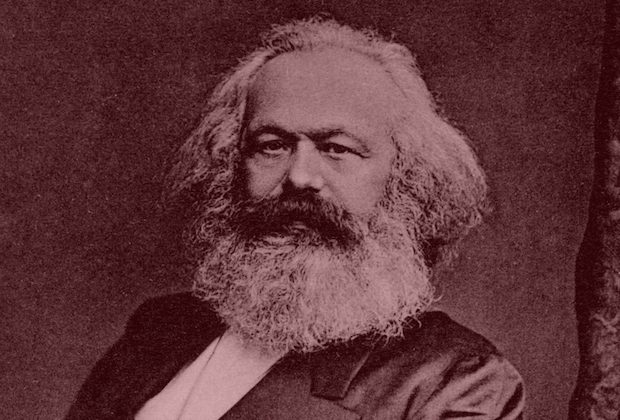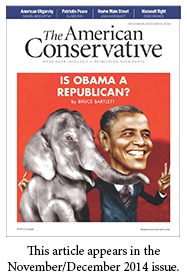What’s Left After Marx

Nearly 40 years ago, conservative sociologist Robert Nisbet saw a new specter that threatened American society. In an essay for Commentary called “The New Despotism,” he condemned the bureaucratization of American life and its whittling away of individual freedom. These new bureaucracies were staffed and run by a new sort of person: Nisbet called them the “New Equalitarians,” and they weren’t interested in making America’s promises of equality before the law and equal opportunity a reality. Rather they were interested in coercively enforcing an equality of result through a regulatory state that would increasingly centralize its power and invade the every nook and cranny of citizens’ lives.
“Equality has a built-in revolutionary force lacking in such ideas as justice or liberty,” Nisbet wrote. “For once the ideal of equality becomes uppermost, it can become insatiable in its demands.”
Four decades later, however, it’s pretty clear that if these New Equalitarians ever existed in any coherent form, they decidedly lost their fight. As French economist Thomas Piketty has empirically shown in Capital in the Twenty-First Century, the West is lurching back to a past where society can be divided into two distinct classes: a rentier class who live off of the proceeds of their capital assets and everyone else who works for a living, often making meager and falling wages unless they’re fortunate enough to be pulling down the “supersalaries” of America’s financial elite. The top 1 percent of Americans own about a third of the country’s wealth and have seen their average incomes rise by 31 percent in between 2009 and 2012, while everyone else’s wages remained stagnant despite considerable increases in productivity.
This wealth concentration, not surprisingly, translates into another form of inequality, that of political power. As researchers Benjamin I. Page, Larry M. Bartels, and Jason Seawright have shown recently, the average American has virtually no say in public policy when their policy preferences diverge from the top percentiles of wealthy Americans. As Founding Father and first Chief Justice John Jay said way back when, “The people who own the country ought to govern it.”
Ironically, the growing inequities of 21st-century life in America have caused a resurgence in equalitarianism, primarily Marxist in sympathy, by a new breed of radical thinkers who are very much concerned with the equality of result or condition that so troubled Nisbet.
One of these thinkers is Benjamin Kunkel. A former best-selling novelist and self-labeled “Marxist public intellectual,” Kunkel has written a little book, really an anthology of previously published essays, called Utopia or Bust: A Guide to the Present Crisis. It is an alternatively witty and impenetrable survey of six major leftist thinkers over the last half-century.
Kunkel’s plunge into autodidactic Marxism was a byproduct of existential angst. Writing about the critical and commercial successes of his novel Indecision, Kunkel admits: “These very welcome developments coincided with the worst depressive episode of my adult life. I can’t say what caused it, but I remember thinking of the poet Philip Larkin’s line about bursting ‘into fulfillment’s desolate attic’.”
What Kunkel is clearly after is community. “Part of the trouble seems to have been that your own fulfillment is no one else’s,” he writes, “and therefore not even quite your own.” In the pursuit of something bigger than himself and a diagnosis of what ails global society after the financial crisis of 2008, Kunkel rediscovered Marxism and began devouring its present-day theorists.
The two best essays in Kunkel’s collection wrestle with the ideas of Marxist historian Robert Brenner and anarchist anthropologist David Graeber. They are the best because they are the most concrete, concerned with the ravages of inequality, the political not natural reasons for this disease’s metastasizing, and how political communities can ameliorate inequality’s rapid rise since the 1970s.
Brenner’s main thesis is that the cause of global economic stagnation during the 1970s wasn’t growing wages squeezing out profits but increased international competition as Europe redeveloped after it had been nearly obliterated in World War II and Asia modernized. If Brenner is correct, then the past few decades of neoliberal policies are even more tragic because by driving down workers’ wages worldwide, businesses don’t have enough customers to realize a reasonable profit. Ironically, their ideological victory undermined their bottom line. Adding to their misery, unsatisfied with the returns from investing in actual production, investors plowed capital into the casino capitalism that nearly took down the global economy in 2008. “Hence,” Kunkel writes, “the financialization of the world economy, delivering more volatility than growth.”
Where there’s finance, there’s debt. And where there’s debt, there’s anarchist David Graeber, a political anthropologist of considerable renown whom Kunkel reads to gain a greater understanding of how debt has functioned as a form of control from antiquity to the present. As Kunkel remarks, “The servicing of debt can … become a way to practically dominate the formally free, to exact a stream of tribute in societies without official hierarchies.”
Graeber finds his solution to the debt crisis in an unlikely place for an anarchist: the Bible. Every 50 years, the ancient Israelites engaged in a jubilee, where all debts were canceled and everyone started with a clean slate. However utopian this sounds, it isn’t crazy when you consider the massive bailouts—the erasure of debt financed by the indebted American taxpayer—that the federal government orchestrated for Wall Street. As Kunkel observes:
A far simpler and more effective monetary policy would have been for the government to print a new batch of money, distribute an equal amount to everyone, then sit back and watch as stagnant economies were stirred to life by the spending and debts were paid down and eroded by temporarily higher inflation. The inconceivability of such a policy is a mark not of any impracticability, but of the capture of governments by a financial oligarchy.
As an analytical tool, Kunkel’s little book shows Marxism remains useful, vibrant, and relevant, even if only among privileged intellectuals and writers, as he freely admits. But as a political program, Kunkel seems to recognize it can lead to nowhere but to tyranny. Much like Marx, Kunkel and the thinkers he analyzes are more content to analyze capitalism’s contradictions rather than to lay out a systematic—and always ill-advised—program for humanity’s liberation.
Kunkel does take shallow stabs at possible reforms, while noting his next book will tackle how to build the free, cooperative, and sustainable society so many of us, left and right, crave. The general outline is full employment at a living wage guaranteed by the state. These solutions to the present crisis aren’t all that novel—they’re pretty standard social democratic fare—but they refreshingly refrain from irresponsible Marxist calls for violent revolution, which historically does far more bloodletting than liberating, or anti-democratic vanguard parties, which lead the stubborn masses toward the promised land. This is important because it shows today’s young, or youngish, radicals know state-imposed socialism won’t work economically, morally, or politically.
Kunkel also smartly stays away from the broad and elitist cultural criticisms that always seems to drag down the left. Any radicalism planted in American soil, as the late cultural critic and former Marxist Christopher Lasch observed, will only grow if it isn’t dismissive of belief, family, and community. Kunkel seems to understand this and also recognizes that capitalism’s insatiable hunger for profit over people undermines the very things that Lasch castigated leftists for criticizing. There are inklings in Kunkel’s writing that his true end game leans toward self-governing communities made up increasingly of worker cooperatives content with more control over their day-to-day lives at the expense of an abundance of material goods.
Kunkel is high on the idea of the government sponsoring workers’ cooperatives. “Such cooperatives would receive startup loans from the government, but would then survive on their own income or, like other businesses, fail,” he writes. “Compensation would be set by workers themselves, and any profits of enterprise likewise distributed by labor/management.” 
There’s much even conservatives might agree with here, for it would begin to produce a society, reminiscent of the Jeffersonian archetype, of self-sufficient small proprietors, farmers, and cooperatives producing for local markets, where the distinction between worker and capitalist becomes harder and harder to discern. The advent of the “locavore” locally-sourced food movement and the 3-D printer/maker movement, both embraced by fringes of the left and the right, should also provoke optimism that a freer and a more cooperative future is possible.
Ultimately, Kunkel’s critiques of capitalism are incomplete: there’s little talk of imperial America’s vengeful wrath overseas, which redistributes massive amounts of Americans’ wealth into the national-security state and the corporations that feed it while undermining democratic institutions and basic civil liberties. Unfortunately, there’s also little discussion in Kunkel’s book of the dignity of meaningful work, which is another area of common ground shared by the old right and left in America.
“The most important issue remains work,” as Lasch observed decades ago, “the loss of autonomy on the job, the collapse of high standards of workmanship, the pervasive demoralization that results from the mass production of goods that are widely recognized as intrinsically worthless by those who produce them, and the general crisis of a culture historically oriented around the dignity of labor.” This alienation persists today.
Increasingly the divides in American life are not between those who defend equality of opportunity versus those who demand equality of result, as Nisbet argued. Rather they are between whether freedom and voluntary association on a more local level can win out over coercion and bureaucracy at an ever more distant national level. Kunkel’s desire for sustainable production by worker-owned businesses and grassroots democratic decision-making seems to envision a new kind of politics, more local and left-libertarian in nature, that transcends easy categorization. And if there is a genuine mood rising among Americans, particularly the young, toward a return to smallness and democratic self-control throughout American society, then the argument now should revolve around means. It’s a discussion neither side should flinch from. Through this tension, modesty and limits may well become the new radicalism both left and right can embrace.
Matthew Harwood is senior writer/editor at the American Civil Liberties Union. His work has appeared at Al Jazeera America, The Guardian, The Washington Monthly, and elsewhere.
Comments